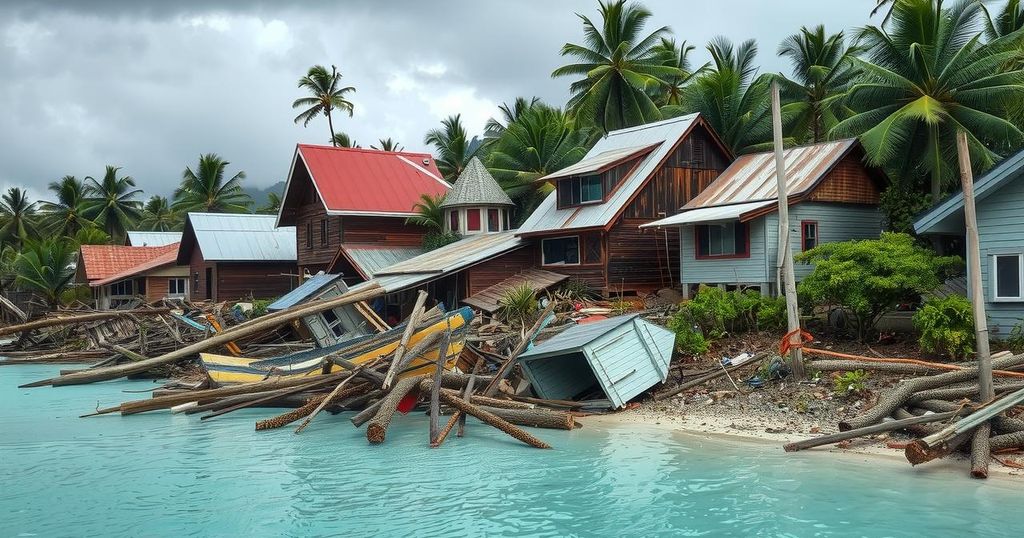Cyclone Chido and Vanuatu Earthquake: A Call for Urgent Humanitarian Response
Tropical Cyclone Chido devastated Mayotte, Comoros, and Mozambique, prompting humanitarian response efforts from Direct Relief. Following this, Vanuatu experienced a 7.3-magnitude earthquake, compounding the challenges for affected communities. Direct Relief is mobilizing resources to address urgent healthcare needs, highlighting the interconnectedness of health risks following natural disasters.
Recently, Tropical Cyclone Chido wreaked havoc across the Mayotte archipelago, Comoros, and Mozambique, resulting in significant destruction and loss of life. Within days, Vanuatu was shaken by a powerful 7.3-magnitude earthquake, further exacerbating the already dire situation. Cyclone Chido was noted as the strongest storm to hit Mayotte in over nine decades, producing catastrophic winds exceeding 140 miles per hour and storm surges reaching 28 feet, leading to widespread devastation, especially in already vulnerable informal settlements housing undocumented immigrants. While Mayotte’s official death toll stands at 22, estimates suggest the number of casualties might rise significantly as assessments progress.
In Comoros, President Azali Assoumani declared a week of mourning due to the extensive damage to the country’s infrastructure. Mozambique, facing vulnerabilities to severe weather, experienced the storm’s full impact, with wind speeds surpassing 160 miles per hour along with substantial rainfall, damaging homes, public infrastructure, and health facilities in the Cabo Delgado province. Disaster response organization Direct Relief is partnering with local health authorities and NGOs to assess the immediate healthcare needs and ensure essential medical supplies reach impacted areas.
Meanwhile, Vanuatu faces its own challenges following the earthquake, with reports of severe damages to homes and healthcare facilities. Direct Relief is coordinating with local healthcare providers to respond to urgent needs, dispatching emergency medical supplies to the region. Disasters such as earthquakes and cyclones pose critical threats to human health, amplifying risks of disease outbreaks due to flooding, displacement of families into unsanitary conditions, and disruptions to the care of chronic illnesses, particularly affecting vulnerable populations like pregnant women and infants.
With a track record of disaster response, Direct Relief has provided significant support in previous incidents, including over 1,000 tons of medical supplies delivered in Türkiye and Syria, and ongoing assistance to countries like Mozambique and Vanuatu. By pre-positioning essential medical resources and collaborating with frontline healthcare providers, Direct Relief is committed to effectively addressing the healthcare needs of communities impacted by these natural disasters, facilitating their recovery through timely medical assistance.
The recent occurrences of Tropical Cyclone Chido and the 7.3-magnitude earthquake in Vanuatu highlight the severe impact of natural disasters on vulnerable communities. Both Cyclone Chido and the earthquake occurred in quick succession, intensifying the challenges faced by affected populations. Tropical Cyclone Chido was characterized as an unprecedented storm causing extensive wind damage and consequential flooding, while the earthquake in Vanuatu resulted in secondary disasters, affecting healthcare and public infrastructure. Organizations like Direct Relief play a pivotal role in assessing needs and delivering necessary medical supplies in the aftermath of such events, addressing the immediate and long-term health risks that arise post-disaster.
The events surrounding Tropical Cyclone Chido and the earthquake in Vanuatu underscore the urgent need for efficient disaster response initiatives. As communities grapple with casualties, destruction of infrastructure, and public health challenges, organizations like Direct Relief are essential in providing emergency assistance and medical supplies. Such support not only addresses immediate healthcare needs but also contributes to the long-term resilience and recovery of affected populations. As the impacts of these disasters unfold, continued commitment to humanitarian aid and healthcare support remains crucial.
Original Source: www.directrelief.org




Post Comment